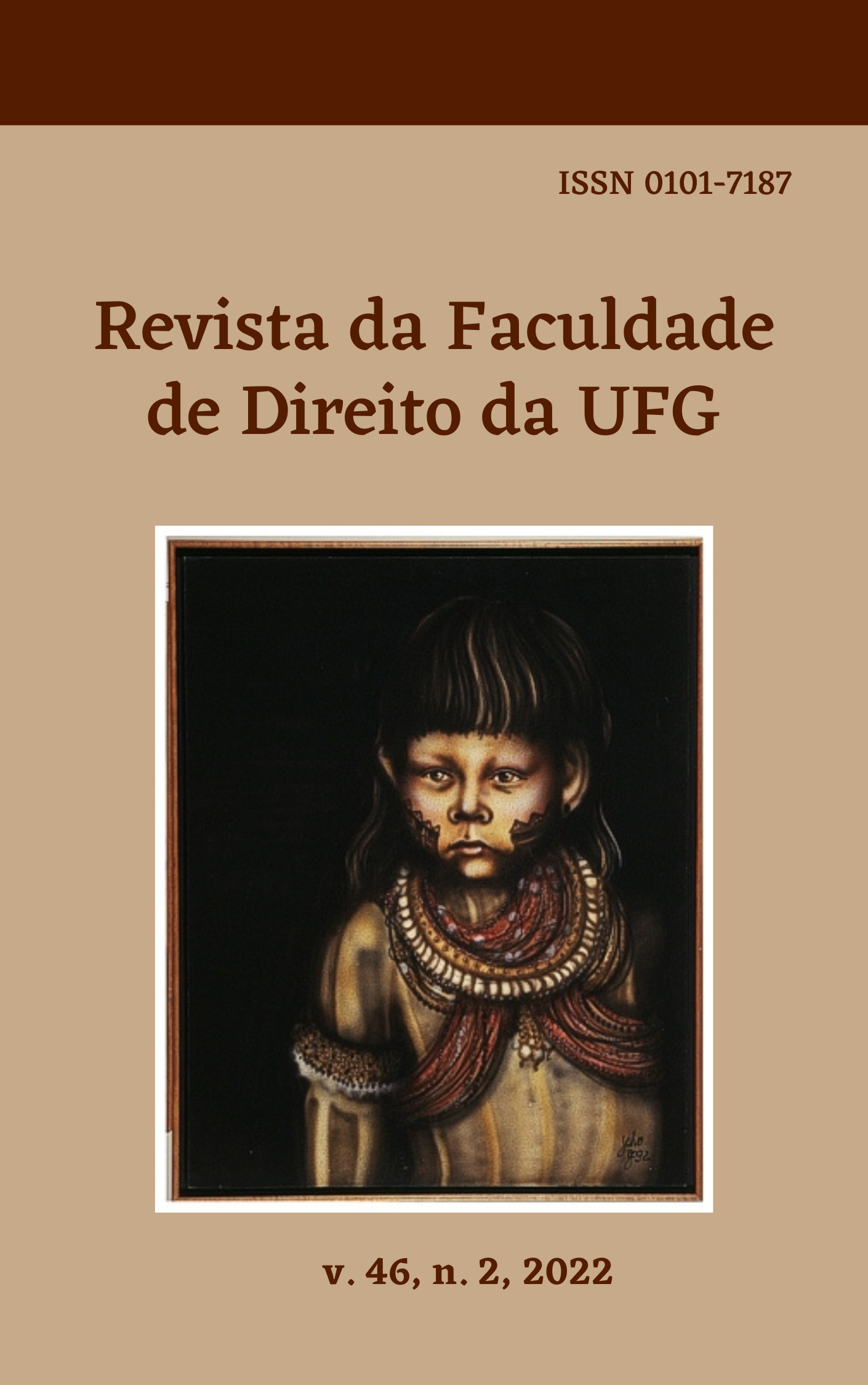Political Judgment, Ideology and Utopia
Political Judgment, Ideology and Utopia
Keywords:
Political Judgment, Ideology, Utopia, ImaginaryAbstract
This present article introduces a specific conception of imaginary, a legal imaginary, through the concepts of political judgment and ideology as developed in the philosophies of Hannah Arendt and Paul Ricoeur. The article then proceeds to clarify the notion of political judgment in Arendt´s work and how ideology and utopia are themselves related in Ricoeur´s reflections on the just. The research adopted literature review centered on those three concepts within the works of Arendt and Ricoeur as its methodology in order to develop a conception of legal imaginary that is entrenched in ordinary legal practice, but also has a potential radical normativity that transcends the values and references that are already part of the legal sphere. The article concludes that this concept of legal imaginary is related to a collective projection of social relations and political structures regarded as more desirable, which characterizes it as essential contestable political concept: each group projects on this imaginary his values, convictions, and desires, interpreting and operationalizing legal norms through such particular references.
Downloads
References
ARENDT, Hannah. The Life of Mind: The Groundbreaking Investigation on How We Think. New York: Harvest Book, 1971.
ARENDT, Hannah. Notas sobre a política e o Estado em Maquiavel. Lua Nova, v. 55–56, p. 298–302, 2002.
ARENDT, Hannah. Understanding and Politics (The Difficulties of Understanding). In: ARENDT, Hannah. Essays in Understanding, 1930-1954: Formation, Exile, and Totalitarianism. New York: Schocken Books, 2005. p. 307–327.
AUSTIN, J. L. How to do Things with Words. 2. ed. Harvard: Harvard University Press, 1975.
BERNSTEIN, Richard J. Arendt on Thinking. In: VILLA, Dana (Org.). The Cambridge Companion to Hannah Arendt. London: Cambridge University Press, 2001. p. 277–292.
CASTORIADIS, Cornelius. The Imaginary Institution of Society. Cambridge, UK: Polity Press, 1997.
CASTORIADIS, Cornelius. The Social Imaginary: A Critical Assessment of Castoriadis´s Psychoanalytic Social Theory. American Imago, v. 59, n. 2, p. 141–170, 2002.
CASTORIADIS, Cornelius. The Imaginary as Such. Social Imaginaries, v. 1, n. 1, p. 59–69, 2015.
CORNELL, Drucilla. The Imaginary Domain: Abortion, Pornography and Sexual Harrassment. London: Routledge, 1995.
CORNELL, Drucilla. At the Heart of Freedom: Feminism, Sex, and Equality. Princeton, New Jersey: Princeton University Press, 1998.
D´ENTREVÈS, Maurizio Passerin. Arendt’s Theory of Judgment. In: VILLA, Dana (Org.). The Cambridge Companion to Hannah Arendt. London: Cambridge University Press, 2001. p. 245–260.
DOLAN, Frederick M. Arendt on Philosophy and Politics. In: VILLA, Dana (Org.). The Cambridge Companion to Hannah Arendt. London: Cambridge University Press, 2001. p. 261–276.
EDLIN, Douglas E. Kant and the Common Law: Intersubjectivity in Aesthetic and Legal Judgment. Canadian Journal of Law and Jurisprudence, v. 23, n. 2, p. 429–460, 2010.
GUYER, Paul. Reason and Reflective Judgment: Kant on the Significance of Systematicity. Noûs, v. 24, n. 1, p. 17–43, 1990.
JACKSON, Emily. Imagining the Future: Drucilla Cornell’ s Transformations and Catharine MacKinnon’s Only Words. Law and Critique, v. 5, n. 2, p. 165–174, 1994.
LEFEBVRE, Alexandre. The Image of Law: Deleuze, Bergson, Spinoza. Stanford: Stanford University Press, 2008.
LEVI, Albert William. The Two Imaginations. Philosophy and Phenomenological Research, v. 25, n. 2, p. 188–200, 1964.
MAKKREEL, Rudolf A. Regulative and Reflective Uses of Purposiveness in Kant. The Southern Journal of Philosophy, v. 30, p. 49–63, 1991.
NASCIMENTO, Paulo César; FERNANDES, Mateus Braga. A phrônesis, o herói e a pólis: os paradoxos de Hannah Arendt como leitora dos antigos. Revista Brasileira de Ciência Política, v. 16, p. 273–292, 2015.
PIOMBO, Horacio J. J. El pragmatismo judicial de Oliver Wendell Holmes, Jr. y la teoría predictiva del Derecho. Doxa. Cuadernos de Filosofía del Derecho, v. 43, p. 189–218, 2020.
PIPPIN, Robert B. The Significance of Taste: Kant, Aesthetic and Reflective Judgment. Journal of the History of Philosophy, v. 34, n. 4, p. 549–569, 1996.
RICOEUR, Paul. Lectures on Ideology and Utopia. New York: Columbia University Press, 1986.
RICOEUR, Paul. Aesthetic Judgment and Political Judgment According to Hannah Arendt. In: RICOEUR, Paul. The Just. Chicago: Chicago University Press, 2000a. p. 94–109.
RICOEUR, Paul. Who is the Subject of Rights? In: RICOEUR, Paul. The Just. Chicago: Chicago University Press, 2000b. p. 1–10.
RICOEUR, Paul. The Act of Judging. In: RICOEUR, Paul. The Just. Chicago: Chicago University Press, 2000c. p. 127–132.
RICOEUR, Paul. The Concept of Responsibility: An Essay in Semantic Analysis. In: RICOEUR, Paul. The Just. Chicago: Chicago University Press, 2000d. p. 11–35.
SCHWARTZ, Jonathan Peter. Hannah Arendt´s Theory of Political Judgment. Thesis—Durham, NC: Duke University, 2014.
ZENKIN, Sergey. Social Action and its Sense: Historical Hermeneutics after Ricoeur. Ricoeur Studies, v. 3, n. 1, p. 86–101, 2012.
Downloads
Published
How to Cite
Issue
Section
License
Os Autores que publicam nesta revista concedem à Revista da Faculdade de Direito da UFG uma licença mundial, sem royalties, sujeita aos termos e condições da Licença Jurídica Creative Commons Atribuição 3.0 Brasil Creative Commons Attribution License
Os autores concedem à RFD UFG todos os direitos autorais sobre os artigos nela publicados, que os mantêm com exclusividade até o advento de domínio público sobre os mesmos.
























